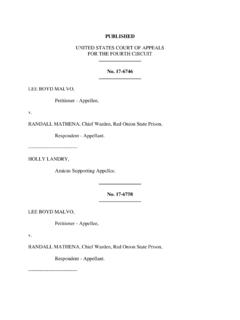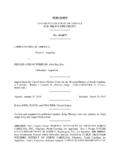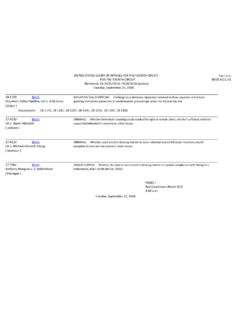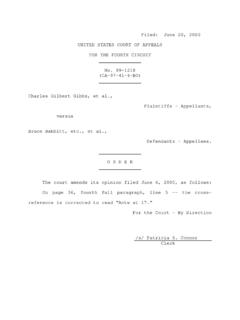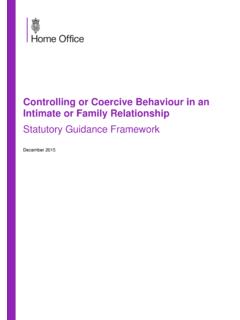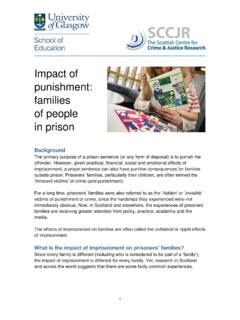Transcription of PUBLISHED
1 PUBLISHED UNITED STATES COURT OF APPEALS FOR THE FOURTH CIRCUIT No. 19-7071 UNITED STATES OF AMERICA, Plaintiff - Appellee, v. JOHN RICHARD PROCTOR, Defendant - Appellant. Appeal from the United States District Court for the District of Maryland, at Greenbelt. Deborah K. Chasanow, Senior District Judge. (8:04 cr 00160 DKC 1) Argued: January 27, 2022 Decided: March 16, 2022 Before GREGORY, Chief Judge, and MOTZ and WYNN, Circuit Judges. Reversed and remanded by PUBLISHED opinion. Judge Wynn wrote the opinion, in which Chief Judge Gregory and Judge Motz joined. ARGUED: Jason Edward Neal, HARRIS, WILTSHIRE & GRANNIS LLP, Washington, , for Appellant.
2 Jonathan Scott Tsuei, OFFICE OF THE UNITED STATES ATTORNEY, Greenbelt, Maryland, for Appellee. ON BRIEF: James Wyda, Federal Public Defender, Baltimore, Maryland, Paresh Patel, Assistant Federal Public Defender, OFFICE OF THE FEDERAL PUBLIC DEFENDER, Greenbelt, Maryland; Christopher J. Wright, HARRIS, WILTSHIRE & GRANNIS LLP, Washington, , for Appellant. Erek L. Barron, United States Attorney, Baltimore, Maryland, David I. Salem, Assistant United States Attorney, OFFICE OF THE UNITED STATES ATTORNEY, Greenbelt, Maryland, for WYNN, Circuit Judge: John Proctor was sentenced as an armed career criminal under the Armed Career Criminal Act, 18 924(e).
3 After the Supreme Court struck down a provision of that Act as unconstitutional, Proctor filed a 28 2255 motion to correct his sentence. The district court denied his motion, however, because it found that Proctor still qualified as an armed career criminal under the statute s force clause. Proctor appealed, arguing that this clause is inapplicable because one of his predicate convictions Maryland assault with intent to prevent lawful apprehension or detainer is not a categorically violent felony for Armed Career Criminal Act purposes. We agree, and therefore reverse the district court s decision and remand with instructions to correct Proctor s sentence. I.
4 On December 8, 2004, a grand jury issued a four-count Superseding Indictment charging Proctor with various drug and firearms offenses. In exchange for dismissing two of these charges, Proctor pleaded guilty to one count of possession with intent to distribute cocaine base in violation of 21 841(a)(1) ( Count 2 ), and one count of unlawful possession of a firearm as a previously convicted felon in violation of 18 922(g) ( Count 4 ). In general, a violation of 922(g) subjects a defendant to a maximum sentence of ten years imprisonment. See 18 924(a)(2). However, the Armed Career Criminal Act provides that a person who violates 922(g) and who has three previous convictions.
5 For a violent felony or a serious drug offense, or both, .. shall be .. imprisoned not less than fifteen years. Id. 924(e)(1) (emphasis added). 3 At sentencing, the district court found that Proctor was subject to the fifteen-year mandatory minimum sentence as an armed career criminal based on two serious drug offenses and one violent felony. The violent felony in question was a 1986 conviction for assault with intent to prevent lawful apprehension, in violation of the since-repealed Md. Code Ann. art. 27, 386 (repealed 1996) [hereinafter 386 ]. Ultimately, the district court sentenced Proctor to concurrent sentences of 324 months imprisonment on Counts 2 and 4.
6 Proctor has made several attempts to reduce his sentence, with some success: in 2011, the district court reduced Proctor s concurrent sentences to 292 months due to retroactive changes to the Sentencing Guidelines; and in 2020, the court further reduced his concurrent sentences to 240 months each pursuant to 404 of the First Step Act. However, Proctor s initial attempt to vacate his sentence did not fare as well. In 2007, he filed a 28 2255 motion that raised claims of ineffective assistance of counsel, but the district court denied his motion and we declined to issue a certificate of appealability. See United States v. Proctor, 329 F. App x 502, 503 (4th Cir.)
7 2009) (per curiam). But in 2016, this Court granted Proctor authorization to file a second or successive motion under 2255 after concluding he had made a prima facie showing that the new rule of constitutional law announced in Johnson v. United States (Johnson II), 576 591 (2015),1 and held to apply retroactively to cases on collateral review by Welch v. 1 We refer to this case as Johnson II because it followed an earlier decision by the same name that interpreted the meaning of the force clause. See Johnson v. United States (Johnson I), 559 133, 140 (2010). 4 United States, 578 120, 130 (2016), may apply to his case, specifically his enhanced 922(g) Before Johnson II, the Armed Career Criminal Act defined a violent felony as any crime punishable by imprisonment for a term exceeding one year that (1) has as an element the use, attempted use, or threatened use of physical force against the person of 2 Johnson II does not directly impact Proctor s concurrent drug sentence for Count 2.
8 But in his instant 2255 motion, Proctor argues that he should be resentenced on both counts under the sentencing-package doctrine. In its response below, the Government invoked the concurrent-sentence doctrine, arguing that the court need not decide the merits of Proctor s challenge to his sentence for Count 4 because his concurrent drug sentence remains valid. The district court chose not to exercise its discretion under the concurrent-sentence doctrine; instead, it reached the merits and found the Armed Career Criminal Act still applied to Proctor s sentence for the gun conviction, Count 4. Proctor v. United States, No. RWT-16-1671, 2019 WL 141370, at *4 (D. Md. Jan. 9, 2019).
9 Because the court denied relief on the merits, it also found it unnecessary to examine whether the sentencing-package doctrine applied. Id. On remand, the district court should consider in the first instance whether the sentencing-package doctrine does apply. We express no opinion on what action the district court should take regarding Proctor s drug sentence, but observe that 2255 confers a broad and flexible power to the district courts to fashion an appropriate remedy, including the power to resentence Proctor on Count 2 if the court finds it appropriate. See United States v. Smith, 115 241, 245 (4th Cir. 1997) (quoting United States v. Hillary, 106 1170, 1171 (4th Cir.))
10 1997)) (holding that since the term sentence in 2255 must be viewed in the aggregate, a district court has jurisdiction to conduct a resentencing on all surviving counts in a multi-count indictment when only one of the counts had been successfully challenged in a collateral proceeding); United States v. Said, __ __, 2022 WL 535197, at *10 & (4th Cir. Feb. 23, 2022) (reversing the district court s grant of 2255 relief on two counts while affirming it on one, and noting that on remand, the district court could consider in the first instance whether to resentence the petitioner on any other count under the sentencing-package doctrine ); see also United States v.
